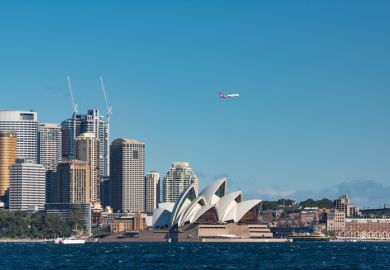Australia could escalate the global arms race over post-study work visas by extending graduate employment entitlements to offshore students.
The country’s new international education strategy says Australia should “seek to attract new cohorts of students who may not wish or be able to travel to Australia, but want to benefit from an Australian education [and] post-study work opportunities in Australia”.
The strategy was released after the federal government announced that post-study work rights for taught master’s students would be extended from two years to three, trumping Britain’s two-year graduate employment regime that is thought to have boosted the UK’s South Asian enrolments at Australia’s expense.
THE Campus resource: Helping international students navigate transitions, part one
And it comes as the emergence of the Omicron variant further slowed Australia’s long-awaited reopening to international students, with the country’s cautious handling of the response to Covid-19 seen as having handed a competitive advantage to northern hemisphere rivals such as Canada and the UK.
The number of Australian student visas granted to offshore applicants over the first half of 2021 was 18 per cent lower than the equivalent period last year, and 61 per cent down on 2019 figures.
The federal education department said the strategy “commits the government to working with the sector to review future visa settings” but cautioned that no decision on further changes to post-study work visas had been taken yet.
“[It] promotes the growth opportunities presented by new markets, particularly online, offshore and through blended delivery. Visa settings are one element that can make Australia more attractive,” a spokeswoman said.
University of Technology Sydney deputy vice-chancellor Iain Watt said the education department had “listened to the sector” in framing the international education strategy.
“For students who undertake Australian qualifications elsewhere, a mechanism allowing them to come to Australia to help us meet our skills gaps is a good thing to put on the table for discussion,” he said. “But there are arguments both for and against.”
Mr Watt said such a model risked depriving Australia of over half of the financial benefits from international education, which accrued through students’ and their families’ spending on things like accommodation, food and travel.
The idea also carried regulatory risks, with courses provided offshore much harder to police than those conducted locally. Previous disasters, notably the multibillion-dollar defrauding of the VET FEE-HELP diploma loans scheme, had demonstrated the dangers of poorly overseen policies.
“That was inside Australia,” Mr Watt noted. “If they set up a system whereby anybody anywhere can open a college delivering information technology courses on the basis that students will get temporary entry to Australia, you can imagine the flood of enrolments. It is a far riskier business line than the current one – a high-volume, low-margin business subject to arbitrary regulation by the country in which we operate.
“And we’d be competing without the inbuilt advantage of being in Australia, which is what underpins the whole attractiveness of our onshore offering.”
Andrew Norton, professor in the practice of higher education policy at the Australian National University, said the idea of offering post-study work visas to offshore students was “a big policy departure” that could encourage enrolments in Australian universities’ overseas campuses, where fees tended to be substantially lower than in home campuses.
Australian branch campus development has focused on Asian states such as Indonesia, Malaysia and Vietnam in recent years, with a number of institutions setting up additional offshore hubs for international students during the pandemic.
But Professor Norton said the visa proposal could undermine “traditional arguments” premising international graduates’ employability on their familiarity with Australia. He also worried that Australia was stringing people along on the hope of obtaining permanent residency that most would never achieve under policy settings under constant revision.
“I’ve got real concerns about the huge numbers of long-term temporary migrants,” Professor Norton said. “You’ve got this problem of a totally uncapped international student pool, an uncapped temporary graduate visa pool and a very tightly capped permanent residency pool where the rules can easily change in ways that don’t favour former international students.”
Omer Yezdani, director of planning and strategic management at the Australian Catholic University, said the federal government was being “adaptive” in introducing a new international education strategy well before the current one’s expiry in 2025. “There’s been such a seismic shift in behavioural patterns [since Covid]”, he said. “The underlying assumptions need to be seriously revisited.”
But Dr Yezdani said the strategy’s encouragement of offshore study stood at odds with its aim to cultivate a “sense of belonging” among international students. “As we’ve seen during Covid, it’s very difficult…for an international student who’s studying offshore to retain that strong sense of attachment.”
POSTSCRIPT:
Print headline: Visa arms race hots up with Canberra offshore plan
Register to continue
Why register?
- Registration is free and only takes a moment
- Once registered, you can read 3 articles a month
- Sign up for our newsletter
Subscribe
Or subscribe for unlimited access to:
- Unlimited access to news, views, insights & reviews
- Digital editions
- Digital access to THE’s university and college rankings analysis
Already registered or a current subscriber?








